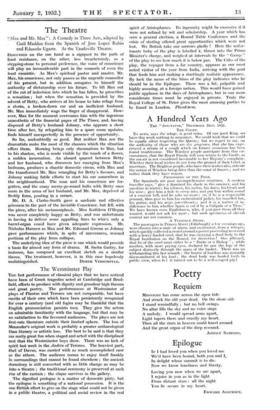The Westminster Play THE last performance of classical plays that
we have noticed have been of Greek tragedies acted at Cambridge and Brad- field, efforts to produce with dignity and grandeur high themes and great poetry. The performances at Westminster of plays of Plautus and Terence are not comparable, but have merits of their own which have been persistently recognized for: over a 'century (and old fogies may be thankful that the English pronunciation persists too). They give the actors an admirable familiarity with the language, but that may be no satisfaction to the favoured audiences. The plays are not first-rate literature outside their limited sphere. The loss of Menander'w original work is probably a greater archaeological than literary or artistic loss. The best to be said is that they are really great fun when staged and acted with the disciplined zest that the Westminster boys show. There was no lack of spirit last week in the Andria of Terence. The heaviest part, that of Davos, was carried with as much accomplished ease as the others. The audience comes to enjoy itself frankly in surroundings that cannot be found elsewhere ; the ancient dormitory is still converted with as little change as may be late a theatre ; the traditional ceremony is preserved at each rise of the curtain ; the claque survives in the gallery.
The dignified prologue is a matter of domestic piety, but 'the epilogue is something of a national possession. It is the one British effort to give on the stage what could not be given in a public theatre, a political and social review in the real spirit of Aristophanes. Its ingenuity might be excessive if it were not refined by wit and scholarship. A year which has seen a general election, a Round Table Conference and the crisis of sterling offered great opportunities which were not lost. We British take our sorrows gladly ! Here the unfor- tunate baby of the play is labelled X, thrust into the Prime Minister's charge, and weighed at intervals by the " Gump " of the play to see how much it is below par. The Crito of the play, the voyager from a far country, appears as our most noted visitor of the year from India, arriving with the goat that feeds him and making a startlingly realistic appearance. By luck the name of the Simo of the play indicates who he should be in the Epilogue. There was a hit, palpable and highly amusing, at a foreign nation. This would have gained public applause in the days of Aristophanes, but in our more considerate times must be enjoyed in private. Truly the Royal College of St. Peter gives the most amusing parties to be found in London. Plaudimus.






































 Previous page
Previous page